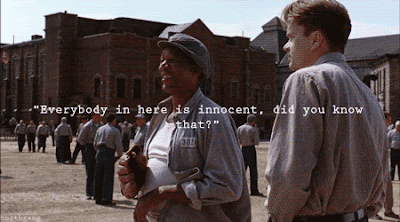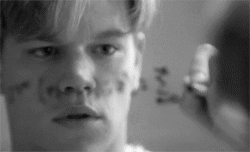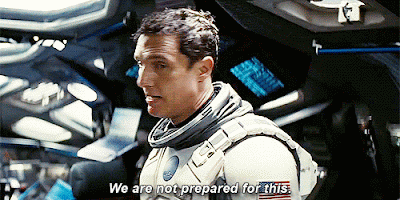The Shawshank Redemption tells the story of two men, "Red" Redding (played by Morgan Freeman) and Andy Dufresne (played by Tim Robbins), who are both prisoners inside Shawshank Prison, convicted of murder. While Red jokingly claims that he himself may be "the only guilty man in Shawshank," Andy was actually wrongfully convicted, forcing him to a lifetime sentence for no reason.
 |
| Via Random Enthusiam |
The pair have their first real interaction when Andy approaches Red with a request for a small hammer, as Red is known as the man that can get things. The series of requests that follow spark Red's interest, and he slowly begins to get to know Andy, who in return begins to become more outgoing around Red and the other inmates. As Andy gains more attention, he is given the opportunity to put his education and financial experience to use, teaching the other inmates, doing the guards taxes, and eventually getting involved in a money laundering scheme for the warden. All of this occurs slowly over the course of several years, as time in prison moves pretty slow when you know you will be there for the rest of your life.
*SPOILER ALERT* One day after about two decades in Shawshank, Andy is nowhere to be found. It is discovered that he has become the first person to escape Shawshank, conveniently around the time Red's parole is soon to be up. By this point, Red is undoubtably Andy's best friend and the reason he does not succumb to the anxiety created by being an innocent man imprisoned. Red is finally able to successfully get out on parole and is left with the mystery of where Andy could be. Unlike many films, the movie provides the viewer with closure, ending on a hopeful note as the final frame concludes with Andy and Red hugging each other on a beach in Mexico, having both finally made it to freedom.
While this film vividly portrays the brutality and misery that come with prison life, it also succeeds in highlighting the importance of good friends and remaining hopeful in tough situations. Although Andy knows he is an innocent man, he struggles to feel purposeful. However, with Red's support, Andy begins to show his personality through a variety of schemes that spice up the monotony of prison life, providing the viewer with a balanced amount of both intensity and lightheartedness. Despite this monotony that comes with years of living the same routine day after day, the film itself is anything but boring. In addition to the plot, the film also teases out the juxtaposition between the institutionalizing of the inmates and the hope that they must hold onto in order to avoid losing themselves. It is these moments that truly allow the viewer to recognize the mental and emotional toil caused by being locked up, as seen through the heartbreaking suicide of the prison's beloved librarian, Brooks, who is unable to adjust to life on the outside after spending fifty years in Shawshank.
 |
| Via Movie Fan Central |
Andy and Red prove that the only way to avoid such a fate is through reliance on friends in order to maintain hope and stay true to oneself. Or as is commonly quoted throughout the movie, "get busy living, or get busy dying." It is perhaps for these reasons that Shawshank is the highest rated movie on IMDb, making it seemingly one of the most popular films of all time.
 |
| Via Giphy |




























